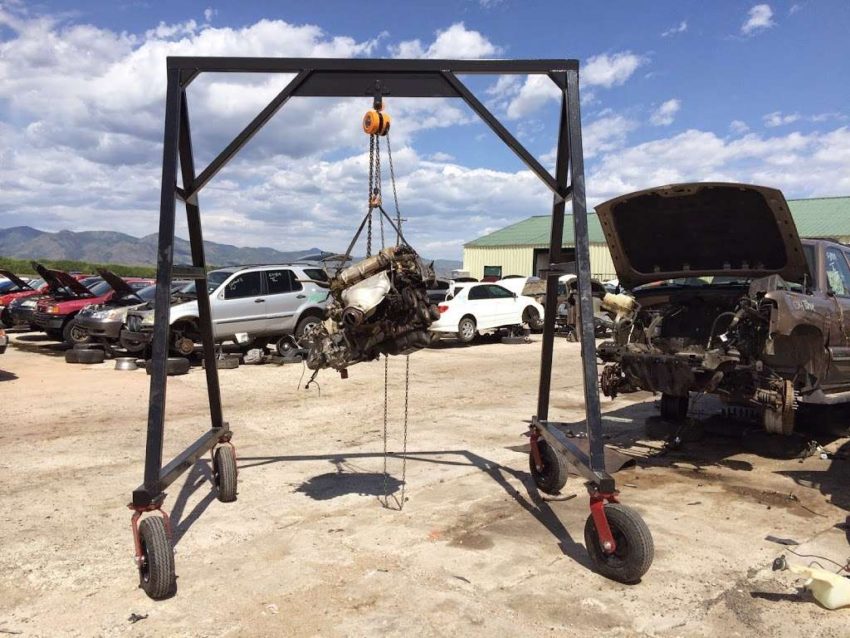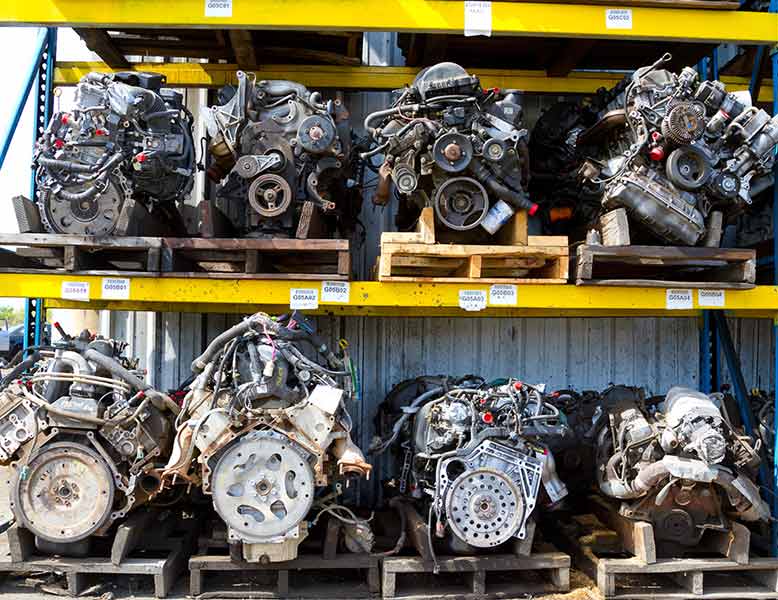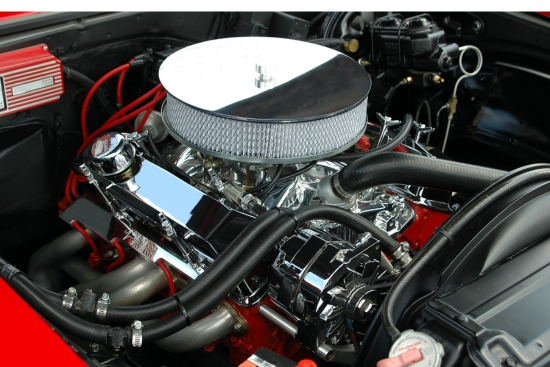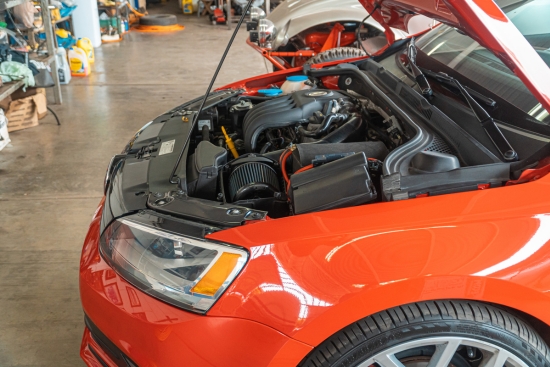Getting an engine used is a great way to save money. Especially since a new crate motor will run in the thousands of dollars. Finding the engine you need can be tricky and then there is the laborious task of pulling it if you are a self-service junkyard. Below I’ll share my experience with buying used engines near me, tips to find what you need, the pros and cons of used motors, and how these places work.
Map of Used Engines Near Me
If you are searching for “Used Engines Near Me”, see below for locations…
Where to Find Used Engines Near Me
The easiest place to find a used engine in your area is at an auto junkyard, aka a salvage yards. There are junkyards all over the country that you can visit or contact to find the parts you need.
Some junkyards are general auto salvages with various makes and models while others specialize. A specialized yard might be exclusive to one manufacturer like Ford, while others may specialize in a vehicle type like construction equipment. All of these yards will have used engines which you can pull and get at a huge discount.
How I Find A Specific Used Engine Near Me…
Depending on my needs will depend on how I conduct my search for used engines near me. For something more modern like say an 07 Toyota Corolla high-output XRS 1.4L 4 cylinder, I can likely hit up any general local junkyard and find one.
For something more vintage like a Toyota Corolla Levin Sprinter Trueno (AE86) 1.6 L 4A-C I4 SOHC, I’m going to have to be more resourceful.
For finding a very specific used engine, it’s better to find a specialized salvage yard. In the example above of the AE86, I am going to find a Toyota-specific salvage like the Yota Yard in Denver or Toyoland. They may not have my engine, but they also may know how to help me get it.
So how do you find the used engine you need:
- Search for your specific manufacturer + salvage yard: for example “Toyota Salvage Yards Near Me”
- Do a Google search for the specific engine: for example “used 1.6 L 4A-C I4 engine” or “Used Toyota AE86 engine”, you may be able to have it shipped
- Check eBay Motors, Craigslist, and Facebook Marketplace
The most popular car manufacturers tend to have salvage yards exclusive to the brand. Some of the most popular are Jeep, Volkswagen, Honda, Nissan, and BMW. If you need specialized parts these are the places to visit, call, and check their inventory online.
Pro Tip: The more you know about your manufacturer and model the more options you may have. For example, many brands use the same engines on various years of a model. Some may even use the same engine on an entirely different model. That means in my 07 Corrolla example above I can pull engines from any Corolla from 1007 to 2013. Now I have a much wider selection to choose from.
How Auto Salvage Yards Operate…
Salvage yards take in junked vehicles and then sell off the used auto parts that are still functioning. Some vehicles will be already picked apart, some cars will look fine, but may not be running, and others will have been in accidents. Inventory for salvage can come from private owners, insurance companies, businesses, and auctions.
Many salvage yards maintain an online inventory of their vehicles. You can search the year, make, and model to see if they have the engine you are looking for. When I find a vehicle that may have my engine, I call ahead and ask about the condition. I like to ask if the engine is still in it and if it was from an accident where is the damage.
Various Types of Junkyards
Salvage yards have a few other features and different styles just as self-service, full-service, warehouse yards, and online.
Self-Service Junkyards
A self-service junkyard, sometimes called a pick and pull, you do all the work. You walk the yard, find the parts you need, use your own tools to remove and replace them, and then pay for the parts you take.
For removing an engine, many yards have free A-frames you can use and wheelbarrows to carry the engine to checkout. These yards typically charge a few dollars to walk the yard. In my experience, you find lower-quality inventory, but cheaper parts. These are where I have the most success pulling used engines near me.
Full-Service Junkyards
These yards, you walk the yard to find what you need, then contact an attendant who pulls the parts for you. They use their tools and can use a vehicle to move a motor to your truck. In my experience, these yards have higher-quality inventory, but charge more for parts since customers say they provide the labor.
Warehouse Junkyards
Warehouse junkyards are actually not “yards” at all. They are a warehouse of used parts that have been pre-pulled from junked vehicles. The advantage here is that the engines have already been removed, labeled, and inventoried. This makes finding what you need easier because the work is already done and the inventory is organized.
In many cases, these places also inspect the engine upfront to make sure it works. Here you get better quality used motors but pay a bit more than a self-service yard. I have had a lot of luck finding quality used engines near me at this style of yard.
Online Junkyards
These are yards that are not open to the public, but the inventory is available online. Some have their own websites while others post their inventory on Ebay Motors. Some are warehouse style, and stock up with pre-pulled used motors, while others will remove the engine only after you order it. The biggest downside to this style of yard is that you are going to pay shipping and you will have to wait for the engine to arrive.
Ask About a Warranty
Some yards will automatically offer a warranty on a used engine, while for others you must ask and pay for it. In my experience the warranty cost is nominal and the typical warranty is 30 days. I have never seen a salvage offer cash back it is always exchange or credit.

What Does it Mean to Buy “Used”?
When you buy an engine used, you are purchasing it in “as-is” condition. This means you are accepting the engine and all its internal components in their current state, which might include normal wear or even some replaced parts. This is why it is important to ask about a warranty when purchasing a used engine. A warranty can provide some assurance of quality and functionality, ensuring that the engine meets certain quality standards despite being used.
Purchasing a used engine online is often a more affordable option compared to buying new. However, it’s crucial to understand what you’re getting into. Used engines for sale might come from various sources, such as salvage yards or online platforms. Therefore, verifying the mileage, condition, and history of the engine is essential. This way, you can gauge whether the engine is a great option for your vehicle and ensure that you’re making a wise purchase decision.
Alternatives to Getting Used Engines
Buying a used engine is one of a few options you can consider for your repair or project car. You can also consider rebuilt or remanufactured engines as well. Each of these choices comes with different price points and performance. You can read more here about the difference between used vs rebuilt vs remanufactured engines.
Pros and Cons of Buying Used Engines
Pros
- You can save more than 65% vs buying new.
- Good for a short-term fix.
- You may find an almost new engine on a late mod in a recent accident.
- Cheaper than rebuilt and remanufactured engines.
- Often find original OEM factory-installed engines.
Cons
- Finding quality working parts is difficult (you really need to inspect them before you pull).
- If you can’t find what you need locally shipping an engine can be very expensive.
- Not all places will offer a warranty.
- Finding the specific engine you need can take a lot of research, the older the resto the harder it is.
Tips for Pulling a Used Engine at a Junkyard
This is the process I follow when pulling an engine or any used parts.
- Before you head to the yard to pull an engine, first remove the engine from the vehicle you are working on. Set aside all the tools you used so you can take them to the yard with you. Doing this will also help learn what to do, so you can move faster in the salvage yard. Also, save all nuts and bolts and label them, I like to put them in a piece of cardboard.
- Do research to find vehicles of various years and models that have interchangeable parts with your vehicle. Call ahead to yards and ask about the condition and availability of what you find.
- At the yard do a thorough inspection of the engine before you even consider removing it. Try turning the belt to see if it is seized.
- Remove the engine, preferably using a hoist. If something seems stuck you can cut it out with a sawsal and then clean it up at home.
- Ask about a warranty on the engine.
How to Evaluate a Used Engine at a Salvage Yard
Here is a video on how to properly evaluate a used engine or a used transmission before you pull it.

Legal and Environmental Considerations
Regulations on Used Engine Sales
When it comes to used engines for sale, it’s crucial to understand the legal landscape. Different regions have varied regulations governing the sale of used engines. These laws ensure that the engines meet certain quality standards and don’t have damaged components. For instance, a car engine that’s being resold must often pass emissions tests to ensure it doesn’t exceed gas emission limits. This is not just about maintaining a quality engine though; it’s about adhering to environmental protection standards.
Buyers and sellers must be aware of these regulations to avoid legal complications. For those in the business of selling engines, staying informed about the latest legal requirements is part of their process. This includes ensuring that all engines, whether rebuilt or used, have the correct documentation and meet all necessary specifications.
Environmental Impact of Reusing Engines
Reusing engines, such as used engines or rebuilt engines, can have a significant positive environmental impact. By choosing a quality used engine or a rebuilt engine, you’re essentially recycling a major car component. This practice reduces the need for new engines and transmissions to be manufactured, which in turn decreases the consumption of raw materials and energy.
Moreover, reusing engines helps in reducing waste. An engine that still has life left in it doesn’t end up in a landfill. This is especially important considering the complex components and materials involved in engine manufacturing, which can be harmful to the environment if not disposed of properly.
Additionally, used engines often come at an affordable price, making them a great option for those who need an engine upgrade or replacement but are on a tight budget. Not only does this make economic sense for the customer, but it also promotes the idea of sustainable consumption.
In the context of vehicles, opting for replacing a used engine can extend the life of the car without the environmental impact of producing a new engine. It’s a win-win situation where the vehicle gets a new lease on life, and the environment benefits from reduced resource depletion.
In conclusion, the sale and purchase of used engines and complete rebuilt engines are not just transactions. They are part of a larger industry movement towards sustainability. By understanding and adhering to the regulations and recognizing the environmental benefits, both sellers and buyers contribute positively to a more sustainable future.
Used Engines Near Me Conclusion
Used engines offer a smart, affordable solution for those looking to save money on car repairs or restoration projects. When searching for used engines near me, it’s essential to strike the right balance. You need to find an engine that not only fits your vehicle but also meets your quality and budget requirements. Whether it’s for a repair job, a project car, or a classic car restoration, the journey involves thorough research followed by some serious work.
The process of finding the right used engine involves a blend of diligence and practicality. If you’re working on an older model, the search for engines good enough becomes more specific, as these engines might not be readily available. This is where specialized sources for engines online or local garage sales can be invaluable. Remember, the goal is to find a quality used engine that doesn’t compromise on performance.
Once you’ve located the right engine, the next steps are critical. Deciding whether to undertake the engine replacement yourself or to hire a professional is a key decision. Installing a used engine requires not just technical know-how but also an understanding of your car’s system and specifications. It’s a task that combines research, skill, and a bit of elbow grease. But, with the right approach and resources, securing a used engine can be a rewarding and cost-effective solution for your automotive needs.



